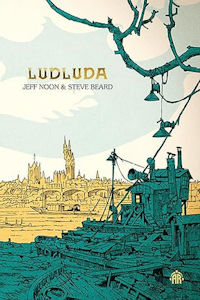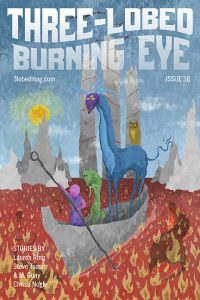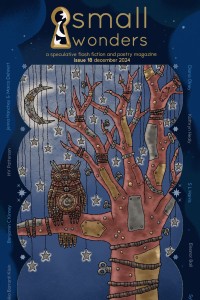Ludluda by Jeff Noon and Steve Beard: Review by Paul Di Filippo
 Ludluda, Jeff Noon and Steve Beard (Angry Robot 978-1915998316, trade paperback, 400pp, $18.99) December 2024
Ludluda, Jeff Noon and Steve Beard (Angry Robot 978-1915998316, trade paperback, 400pp, $18.99) December 2024
I am happy to bring readers this exciting news: the genre known as New Weird is currently alive and kicking, despite any rumors of its moribund state, or lack of recent exemplars. The evidence? The fascinating and thrilling duology set before us, Gogmagog and Ludluda.
New Weird—with undeniably deeper roots, not to be slighted by this shorthand history—burst upon the scene in the year 2000 with the publication of Perdido Street Station, by China Miéville. A genre more nebulous and hard to nail down than most, the format could be distinguished, in the words of Dave Langford at the Science Fiction Encyclopedia, thus: “Complex, grimy urban-noir settings and a fondness for grotesquerie are characteristic but not necessarily defining qualities. Perhaps more useful is the sense that New Weird stories freely mingle SF, Dark Fantasy and Horror tropes …” Editors Ann and Jeff VanderMeer, quoted in the Wikipedia entry on the topic, say that it’s “a type of urban, secondary-world fiction that subverts the romanticized ideas about place found in traditional fantasy, largely by choosing realistic, complex real-world models as the jumping-off point for creation of settings that may combine elements of both science fiction and fantasy.”
In any case, most savvy readers will recognize New Weird when they bite into it, as distinct from other genres. And this creation by Jeff Noon and Steve Beard has the primo taste.
Jeff Noon needs no introduction, since he’s been a distinguished player since his first novel, Vurt, and he’s recently completed the Nyquist Quartet. Steve Beard, a name less familiar, nonetheless boasts a respectable bibliography, and has collaborated with Noon before this outing. They certainly must be simpatico, since the prose of the new series demonstrates an unfaltering singular voice.
I should mention that Gogmagog and Ludluda are truly one novel split into two books. There’s no way to enjoy the second without reading the first. Be advised.
I think our point of entry into this series is going to start with our protagonist, who appears on every page of both books. So unique and memorable is she, and so central to the doings of the books, that we need to grok her before contemplating the other wonders.
Arcadia “Watchwoman” Meade appears at first to be a cranky, curmudgeonly, foul-mouthed old woman in her late seventies, retired from her decades of skippering a small passenger boat that traverses the river Nysis from its outlet into the sea way up to the city of Ludwich. When we first encounter her, she lives in a shack at the mouth of the Nysis, surviving on a meager income, and kills time by idling along the docks. Her only friend is a young man named Yanish.
But all this is mere façade. Cady is over a thousand years old, a being half plant and half flesh, secretly appointed one of the guardians of the world, holding herself ready to battle any supernatural challenge to civilization. Capable of magical regeneration back to a youthful state, she lives one mortal span after another. Although as we will soon see, current abnormal conditions will stymie her latest regeneration, trapping her in her senior citizen form.
We begin to get hints of Cady’s nature when two strangers arrive, looking for her. One is a “Thrawl” named Lek; he is a half flesh, half mechanical man, his soul essence held in a crystal in his head. Lek was a kind of butler to the Halsegger family, now nearly extinct, and he is currently protector to the ten-year old Brin Halsegger. Brin is a strange silent girl, able to manipulate cosmic energies, but still immature. She is on the point of “hesting,” a bodily phase change that will see her enter maturity—and with it, the full blooming of her powers. (Brin and Cady belong to different humanoid species, and there are several other races as well, conferring an exoticism on the culture.)
Lek tells Cady that Brin’s hesting must occur in Ludwich, and Cady is their only means of getting there in time. They will pay her well. Only one problem: travel on the Nysis has dried up, since the river is now supernaturally cursed. Its serpentine course is synonymous with the “ghost dragon” Faynr, and Faynr is sick. Faynr’s evil twin, Gogmagog, becomes more powerful every day, hoping to supplant Faynr and rule in its stead.
Eventually, reluctantly, Cady, with the help of Yanish, reclaims her old craft, the Juniper, and the quartet sets out.
Every bend of the river holds dangers and revelations of the most weird and awesome nature. The creativity of Noon and Beard never flags. Lek, Cady, Yanish and Brin all gradually disclose unseen aspects of their natures. Tensions ebb and flow among the quartet. A big bad, a lord named Olan Pettifer, emerges. It seems he wants to control Brin’s hesting and use her powers for his own designs.
Gogmagog ends thus: “The Juniper passed through the Tithe Gate and entered the city of Ludwich.”
Now Cady revels in her return: “Cady’s green heart sang with the joy of it. She was back! Returned to the city of her first seeding, her growth in the earth, her plucking, and – who knows? – her final blossoming. Ludwich, my Ludwich!” “Final blossoming” refers to the fact that Cady is now sprouting new growth buds, and with suitable magical impregnation will make her final vegetal transformation. This becomes an important side quest.
Yanish has exited the stage, but his role is taken by a charming and colorful young lad named Jeb, who will stand stoutly by Cady to the end.
Brin’s official hesting goes bad and she has to endure a kind of “black market” version. When it does take, however, the worst suspicions of Cady and Lek prove true: Brin is a kind of conduit for Gogmagog and in her new maturity, she is about to bring on an apocalypse. Lek’s inner workings are perturbed, Olan Pettifer proves to be an ally, not an enemy, and the quest to stop Gogmagog from taking over the world zigs and zags across several venues.
Now, here is where Noon and Beard pull a definitely Moorcockian maneuver. I can’t give the surprise away without spoiling it. Let’s just say that Cady’s journey assumes a temporary multiversal course. It’s a bold lateral development that works splendidly.
The duology culminates in a dramatic cataclysmic battle between Gogmagog and Faynr: “The two dragon ghosts met over the Tangle Wood. The Battle of the Skies had begun.”
All the “human” characters survive, each finding their own destiny fulfilled—more or less.
The fecund inventiveness of the collaborators ensures that one strange surprise after another fills their pages. Sometimes, the work calls up Jack Vance’s Dying Earth books; at other times, there’s almost a William Morris feeling. The New Weird incorporation of modernity is not forgotten either: the history of Ludwich includes a recent World War, while various bits of technology are extant. It all blends together in the echt New Weird manner that makes such books feel so different from run-of-the-mill heroic fantasies.
The characters all possess that essentially British Dickensian quirkiness, layered on just enough without becoming parodic. The whole world coheres organically.
But ultimately the book belongs to Cady. If you’ve ever wondered, “What if Swamp Thing were a wildly cussing, indomitable, irreverent old harridan?”, you’ll find your answer here.
Interested in this title? Your purchase through the links below brings us a small amount of affiliate income and helps us keep doing all the reviews you love to read!
 While you are here, please take a moment to support Locus with a one-time or recurring donation. We rely on reader donations to keep the magazine and site going, and would like to keep the site paywall free, but WE NEED YOUR FINANCIAL SUPPORT to continue quality coverage of the science fiction and fantasy field.
While you are here, please take a moment to support Locus with a one-time or recurring donation. We rely on reader donations to keep the magazine and site going, and would like to keep the site paywall free, but WE NEED YOUR FINANCIAL SUPPORT to continue quality coverage of the science fiction and fantasy field.
©Locus Magazine. Copyrighted material may not be republished without permission of LSFF.









